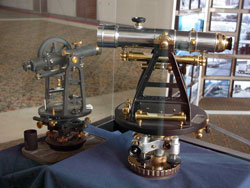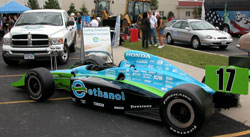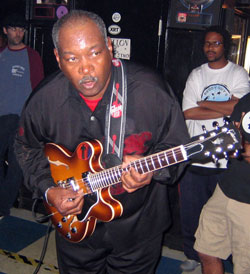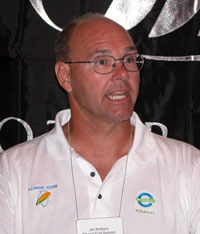 The cross country convoy is in Akron, OH and heading to Pennsylvania today. We got in too late last night to post anything although I have a lot of good stuff for you.
The cross country convoy is in Akron, OH and heading to Pennsylvania today. We got in too late last night to post anything although I have a lot of good stuff for you.
Before leaving Tinley Park, IL though we had a big press conference. The Illinois Dept. of Transportation has a very nice display of pictures of old highway construction, including equipment like this that I found fascinating.
I’ll have more tonight.
Domestic Fuel coverage and participation in the AASHTO Interstate 50th Convoy is sponsored by the Ethanol Promotion and Information Council.



 Clovis, New Mexico is the future site of a 105 million gallon a year ethanol plant planned by private equity firms
Clovis, New Mexico is the future site of a 105 million gallon a year ethanol plant planned by private equity firms  On Sunday in Tinley Park, IL we set up a display with information about ethanol that used the Rahal-Letterman #17 show car. You could see it in action at
On Sunday in Tinley Park, IL we set up a display with information about ethanol that used the Rahal-Letterman #17 show car. You could see it in action at  We are allowed to play sometimes as we trek across the United States on I-80. Here’s Bob Lee (left), founder of
We are allowed to play sometimes as we trek across the United States on I-80. Here’s Bob Lee (left), founder of 

 About the only thing this post has to do with ethanol is the fact that a lot of it was being consumed around me last night at
About the only thing this post has to do with ethanol is the fact that a lot of it was being consumed around me last night at  Here is a group of medalists. Not in the Olympics but highway medals.
Here is a group of medalists. Not in the Olympics but highway medals. Jim Robbins,
Jim Robbins,  Most of the corn I’ve seen along I-80 looks pretty good. This is near Ottawa, IL. It’s the tallest corn I’ve seen so far coming east.
Most of the corn I’ve seen along I-80 looks pretty good. This is near Ottawa, IL. It’s the tallest corn I’ve seen so far coming east. We stopped in Illinois off the road in Ottawa where the original test site was set up by what is now
We stopped in Illinois off the road in Ottawa where the original test site was set up by what is now